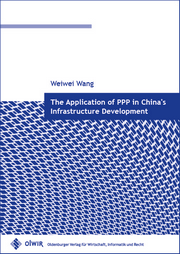Einzeltitel
Weiwei Wang
The Application of PPP in China's Infrastructure Development
The book is targeted to the recent trend that Chinese government has adopted policies attracting private companies to bridge substantial investments still required to develop new and to rehabilitate the existing infrastructure, and is focused on answering the two research questions that why PPP should be widely applied in China (here PPP refers to real PPP), and how the successful implementation of PPP in China can be ensured.
In answering the first research question, the author associated the application of real PPP to the current state-driven infrastructure investment model and concluded that it can solve problems generated by the existing model. Subsequently, the author investigated the institutional frameworks to ensure the successful application of PPPs in China based on theoretical knowledge conferred by Institutional Economics, Public Choice Theory and Principal-Agent Theory, and studied how these institutional frameworks interrelate and interact with the outcomes of PPP projects through analyzing five cases.
Besides the main conclusions of the research, the author found the principal risks of PPP application in China come from government opportunisms, and this conclusion is also in line with some authors who study PPPs in developing countries. Therefore, designing institutional frameworks in China should be emphasized to restrict the government opportunisms. Furthermore, the author proposed methods to align the interests of local government with the development of real PPP projects, thus reducing the transaction costs associated with the institutional changes.
XII, 226 S., Edewecht 2017, € 49,80
ISBN-13 978-3-95599-039-8

